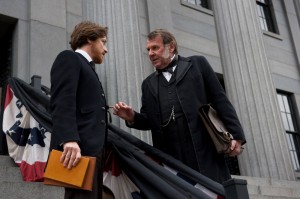
Frederick Aiken (James McAvoy) is advised by elderly lawyer Reverdy Johnson (Tom Wilkinson) to take on a controversial case in Robert Redford’s “The Conspirator.” And it’s all downhill from there. Courtesy of www.thecollider.com
A fascinating, morally complex story from the underbelly of American history seems like it should easily make for a compelling film. Robert Redford apparently had other plans. His new film “The Conspirator” takes a potentially illuminating event and reduces it into a courtroom B-movie, and then, gradually, into heavy-handed liberal pandering.
Even at the peak of his filmmaking powers — such as the Oscar favorite “Ordinary People” — Redford can’t help but beat his audience over the head en route to completing any story. And his last effort, 2007’s “Lions for Lambs,” was a self-important talkathon of anti-war rhetoric. These two weaknesses are toxically combined in this latest release.
“The Conspirator” begins with an event certainly worthy of its own feature: the assassination of Abraham Lincoln. We never get more than a glimpse of the president nor do we get to savor the earth-shattering terror of the event — it’s a cosmic opening that, oddly, feels rushed. Nonetheless, the high tension leading up to the assassination is well played, and the sequence as a whole is an impeccably arranged recreation, which we already feel is setting us up for something different.
That would be the unraveling of the conspiracy to kill Lincoln — an event that, throughout history, has received considerably less attention than what actually transpired that night in the Ford Theater. The investigation eventually leads to one most unlikely suspect: Mary Surratt (Robin Wright), the mother of one of the conspirators and owner of the boarding house where the assassination plans came together. Mary’s connection to the events does not necessarily equate to guilt, but to a nation ravaged with grief and bent on retribution, it might as well. Her only hope is Frederick Aiken (James McAvoy), a Civil War veteran and untested young lawyer who is reluctantly appointed to her defense.
For the first act, the film’s handling of its story gets a little obnoxious — this is the kind of historical drama that relegates a lot of its action to montages of newspaper headlines (example: After we have already seen John Wilkes Booth shot dead, we are shown a newspaper proclaiming, “Booth Shot Dead!”). But once “The Conspirator” gets into the courtroom theatrics — where it remains for almost the entirety of the story — the film grows outright tedious.
The court doesn’t want to hear anything in Mary’s defense, even if it might be very legitimate. Frederick’s attempts at a fair trial are repeatedly shut down, and witnesses seem to be fed false, incriminating answers. The hard-boiled Secretary of War, Edwin Stanton (Kevin Kline), insists that America is only interested in vengeance, and sees no reason for the trial not to play right into that desire.
It’s a set-up for what should be a complicated, paranoid situation. And the personal conflict that Frederick endures — the struggle to defend what he feels is just, even though no one else is on his side — is the most intriguing aspect of the film. But once we initially figure out just what’s going on with the trial, the action barely progresses beyond reiterating its unfairness again and again. The courtroom scenes all become homogenous, right down to the way they are filmed (just about every interior scene looks exactly the same — dark rooms with blinding lights pouring in through every window — as if Redford is a Flickr user far too enticed by the same artsy effect).
“The Conspirator” takes the same ruthlessly one-sided approach to supporting Surratt’s case as the American people apparently took against it. There’s room for moral ambiguity in this story. Think about a film like “The Social Network,” which looked at legal proceedings from only a few years ago but didn’t make judgment in favor of any particular side. This film, meanwhile, has a completely black-and-white view of its story, even though it doesn’t attend to the obvious doubts associated with it.
We’re left with the nagging feeling that Mary’s innocence couldn’t have been as clear-cut as it seems here. We’re also left with the nagging feeling that this whole story is being manipulated into an obvious allegory for the treatment of Guantanamo Bay prisoners and the general American paranoia over terrorist activity.
Maybe Redford should have jumped to make “The Conspirator” sometime in the mid-2000s, when such thinly disguised liberal lectures were all the rage in cinema. It might have helped put the allegory in greater context, but not much can really help a historical drama that’s so out of touch with its own history. Grade: C
Silverstein is a member of the class of 2013


